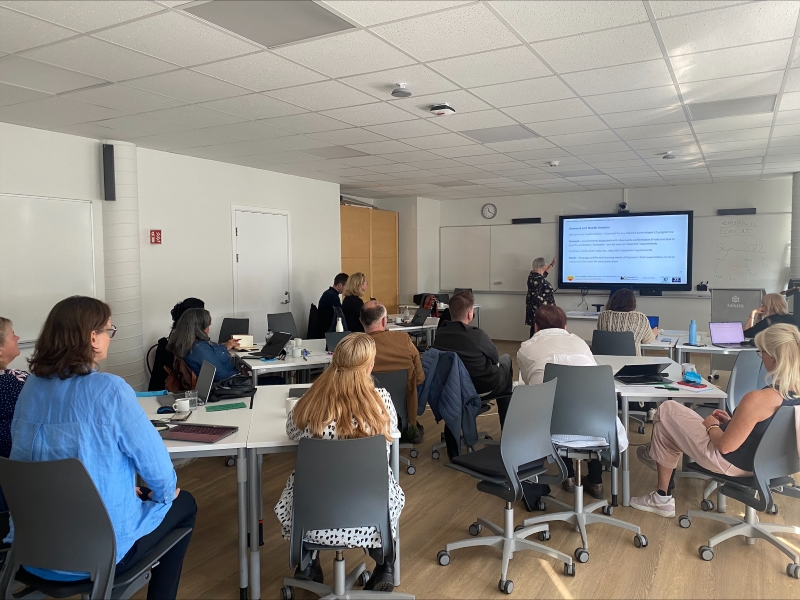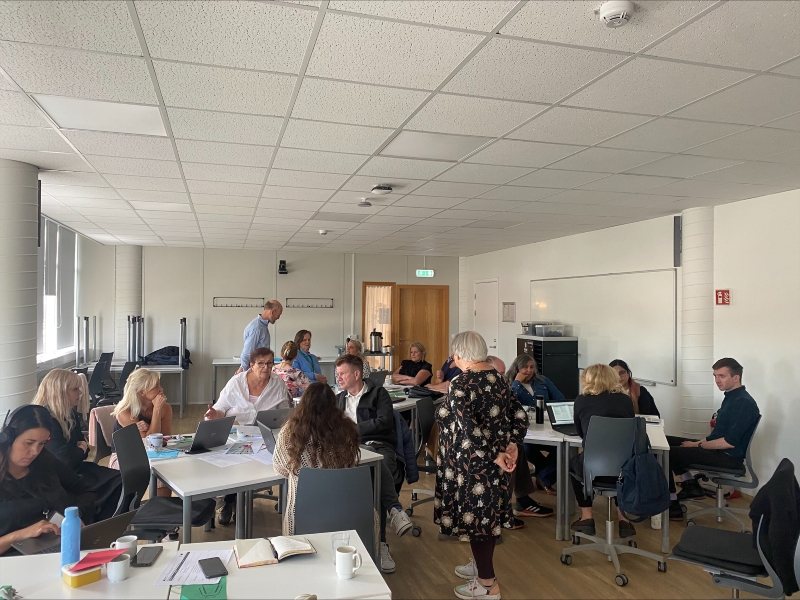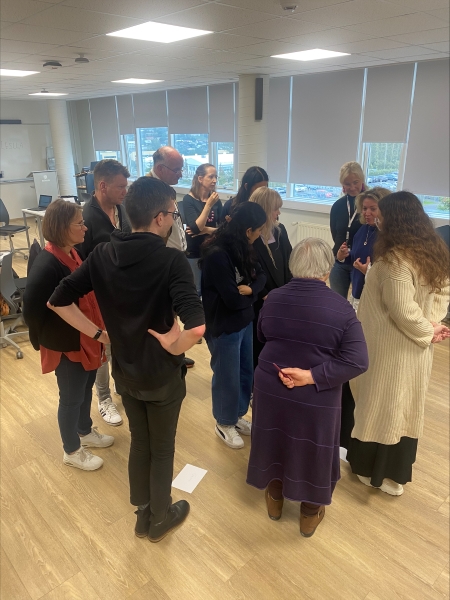Latest articles
08.04.2025
National Training Workshop “Using ICT in support of language teaching and learning (ICT-REV)” (1-2 April 2025, Brussels, Belgium)
ICT in language teaching and learning and beyond!
For many years now, teaching professionals have been aware of the use of ICT in teaching practices. This awareness has grown still further since the Covid pandemic, sometimes leaving good teachers at a loss as they seek to retrain or even leave the profession prematurely. A training workshop of the kind offered by ICT-REV has numerous benefits, which have been fully borne out by the success of this recent workshop in Brussels.
Through its training and consultancy activities, the ECML offers a wide range of opportunities for high-quality training to teaching professionals. Its workshops, based on the practical use of pedagogical and didactic tools, enhance the professionalism of teachers who all too often feel left alone when it comes to designing their courses to meet local standards. The professional development and pedagogical skills of teachers are an asset in fostering education systems that encourage the appropriate use of tools in their daily context. There are many AI-related tools, but their appropriate use often remains a mystery and can prove discouraging.
This training encourages a diversification of approaches and a deepening of students' learning. By making it dynamic and interactive it captures their attention and promotes concentration. Young people today are very often connected but often do not know how to make intelligent use of artificial intelligence tools. Their teachers can be destabilised by the huge range of tools available, how to use them and how to select wisely from what is available online.
Another advantage is that educational teams with similar backgrounds can meet up, not only to exchange ideas and experiences, but also to collectively build on existing good practice. Often, a professional network is created through the establishment of useful connections for the development of teaching tools and materials.
The participants systematically highlight the dynamism and enthusiasm of the moderators, who make this training lively, interactive and varied, and greatly appreciate the opportunity to benefit from their expertise.
Karine Dekeukelaere, local coordinator
French version:
Les TIC dans l’enseignement et l’apprentissage des langues et au-delà !
Depuis, de nombreuses années, les professionnel·le·s de l’enseignement sont sensibilisés à l’utilisation des TIC dans leurs pratiques enseignantes. Depuis la crise Covid, cette conscientisation s’est encore accentuée en laissant parfois de bons pédagogues désemparés cherchant à se reconvertir ou à quitter la fonction prématurément. Un tel atelier de formation a plusieurs avantages et le succès constaté en fait la démonstration.
Le CELV nous offre chaque fois la possibilité de proposer une formation de grande qualité aux professionnel·le·s de l’enseignement. Ces ateliers, basés sur l’usage pratique d’outils pédagogiques et didactiques, permettent de renforcer le professionnalisme des enseignant·e·s qui se sentent trop souvent livré·e·s à eux-mêmes dans la confection de leurs cours pour qu’ils correspondent aux référentiels locaux. Le développement professionnel et celui des compétences pédagogiques des enseignant·e·s sont un atout pour promouvoir des systèmes éducatifs encourageant un usage adéquat d’outils dans leur contexte quotidien. Les outils liés à IA sont multiples, mais leur utilisation adaptée reste souvent un mystère, parfois décourageant.
Cette formation invite à diversifier les approches et à approfondir les apprentissages des élèves en cherchant à rendre ceux-ci dynamiques et interactif·ve·s pour capter l’attention et la concentration de ces apprenant·e·s. Aujourd’hui, les jeunes sont très souvent connecté·e·s, mais ne connaissent pas, dans la majorité des cas, comment faire un usage intelligent d’outils de l’IA. Leurs professeur·e·s peuvent être déstabilisé·e·s devant la masse inconnue d'outils, leur usage et le tri correct dans l’offre en ligne.
La rencontre entre équipes éducatives de mêmes profils est un autre avantage permettant non seulement d’échanger des idées, des expériences, mais aussi d’enrichir collectivement les bonnes pratiques existantes. Souvent, un réseau professionnel se crée par la mise en place de connexions utiles pour le développement d’outils et de matériaux didactiques.
Les participant·e·s soulignent systématiquement le dynamisme et l’enthousiasme des formateur·rice·s qui rendent cette formation vivante, interactive et variée avec la possibilité de profiter de leur expertise.
Karine Dekeukelaere, coordinatrice locale
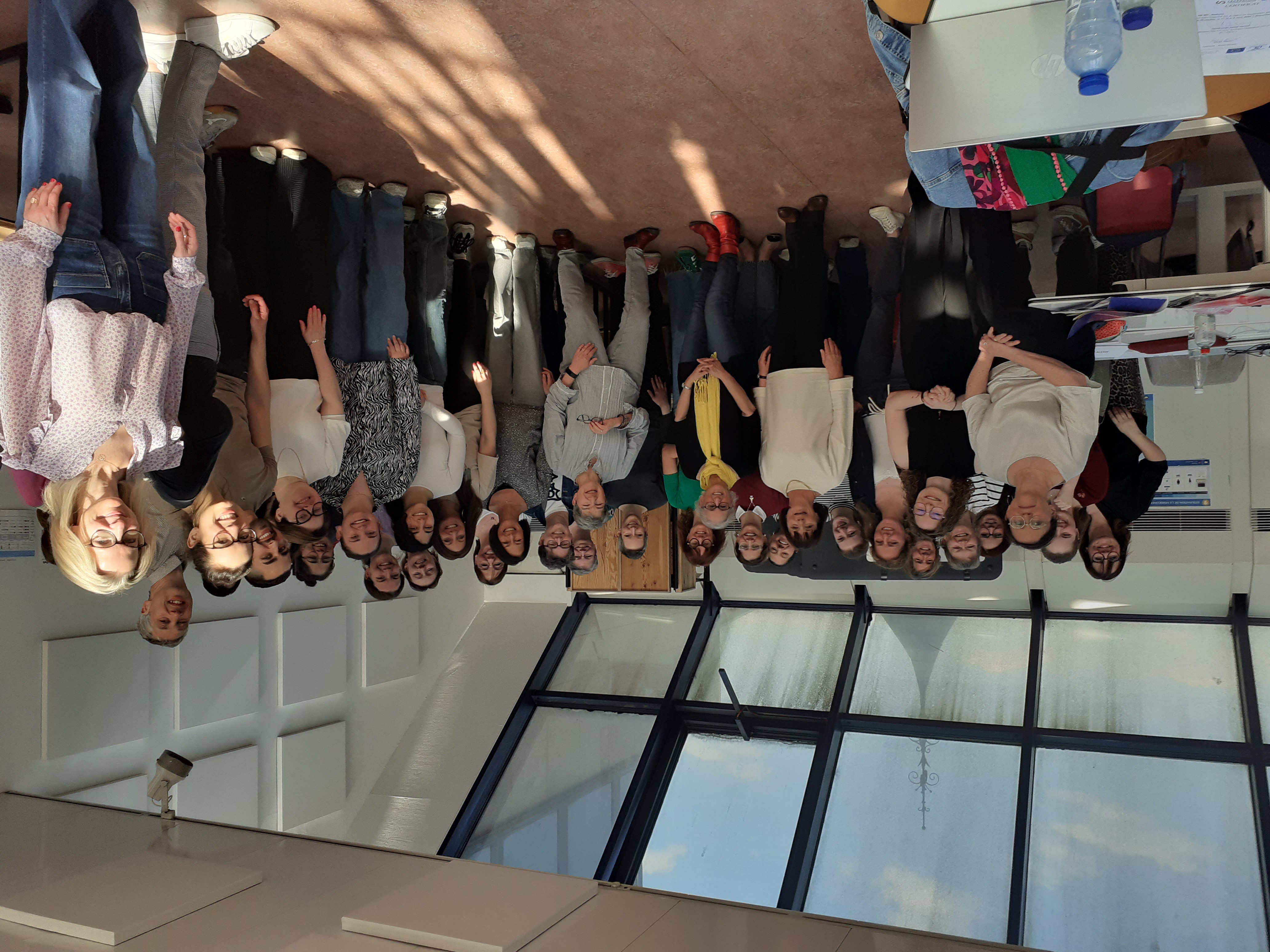
18.12.2024
National Training Workshop “Using ICT in support of language teaching and learning (ICT-REV)” (29-30 November 2024, Vilnius, Lithuania)
Empowering Language Teachers Through ICT-REV Training
The ICT-REV workshop “Use of ICT in support of language teaching and learning” has proven to be a valuable experience for foreign language educators (teachers of English, German and French) providing practical tools and strategies to enhance teaching in the digital age. Organized by the European Centre for Modern Languages together with the Lithuanian Association of Teachers of English (LAKMA) and with the support of the Ministry of Education, Science and Sport of the Republic of Lithuania, this training offered educators ideas for integrating innovative ICT solutions into their classrooms as Lithuanian schools implement the updated, competence-oriented National Curriculum.
The workshop focused on helping teachers address key updates in the foreign language curriculum, such as developing mediation skills, supporting plurilingualism, and fostering global cultural awareness. Participants explored practical ways of using digital tools for activities like audiovisual text production, online interaction, and cross-curricular integration.
The workshop benefited foreign language teachers in several ways. The participants expanded their knowledge of ICT tools and resources, including the ECML’s Inventory of ICT Tools, and understanding how these tools align with modern pedagogical approaches. With support and collaboration, teachers became more confident and motivated to use ICT tools in their teaching. Foreign language teachers strengthened their professional competences, which are essential for increasing students’ motivation to learn foreign languages in a meaningful and effective way.
After the workshop, teachers are better prepared to meet curriculum demands and foster students’ communication and digital competences, ensuring they are ready for a globalized world.
Lithuanian version:
ICT-REV seminaras – vertinga patirtis užsienio kalbų mokytojams
Seminaras „Internetinių tecnhologijų taikymas kalbų mokyme ir mokymesi” tapo vertinga patirtimi užsienio kalbų (anglų, vokiečių ir prancūzų) pedagogams, suteikdamas praktinių įrankių ir strategijų, kaip efektyvinti mokymą skaitmeniniame amžiuje. Šiuos mokymus organizavo Europos šiuolaikinių kalbų centras kartu su Lietuvos anglų kalbos mokytojų asociacija (LAKMA), palaikant Lietuvos Respublikos švietimo, mokslo ir sporto ministerijai. Mokymų metu pedagogams buvo pristatytos idėjos, kaip integruoti inovatyvius IKT sprendimus į pamokas, įgyvendinant atnaujintą, kompetencijomis grįstą Bendrojo ugdymo programą.
Seminaro tikslas buvo padėti mokytojams įgyvendinti pagrindinius užsienio kalbų ugdymo programos atnaujinimus: ugdyti mediacijos gebėjimus, skatinti daugiakalbystę ir stiprinti globalų kultūrinį suvokimą. Dalyviai gilinosi į praktinius skaitmeninių įrankių taikymo metodus, tokius kaip audiovizualinių tekstų kūrimas, internetinė sąveika ir tarpdalykinė integracija.
Seminaras užsienio kalbų mokytojams buvo naudingas keliais aspektais. Dalyviai praplėtė žinias apie IKT įrankius ir išteklius, ir suprato, kaip šie įrankiai dera su šiuolaikiniais pedagogikos metodais. Bendradarbiavimas ir palaikymas mokymų metu padėjo mokytojams jaustis labiau pasitikinčiais savimi ir motyvuotais taikyti IKT savo pamokose. Be to, mokytojai stiprino profesines kompetencijas, kurios itin svarbios siekiant padidinti mokinių motyvaciją prasmingai ir efektyviai mokantis užsienio kalbų.
Dalyvavę mokymuose kalbų pedagogai yra geriau pasirengę įgyvendinti ugdymo programos reikalavimus bei lavinti mokinių komunikacinius ir skaitmeninius gebėjimus, suteikdami jiems galimybę sėkmingai veikti globaliame pasaulyje.
Kristina Urboniene, local coordinator
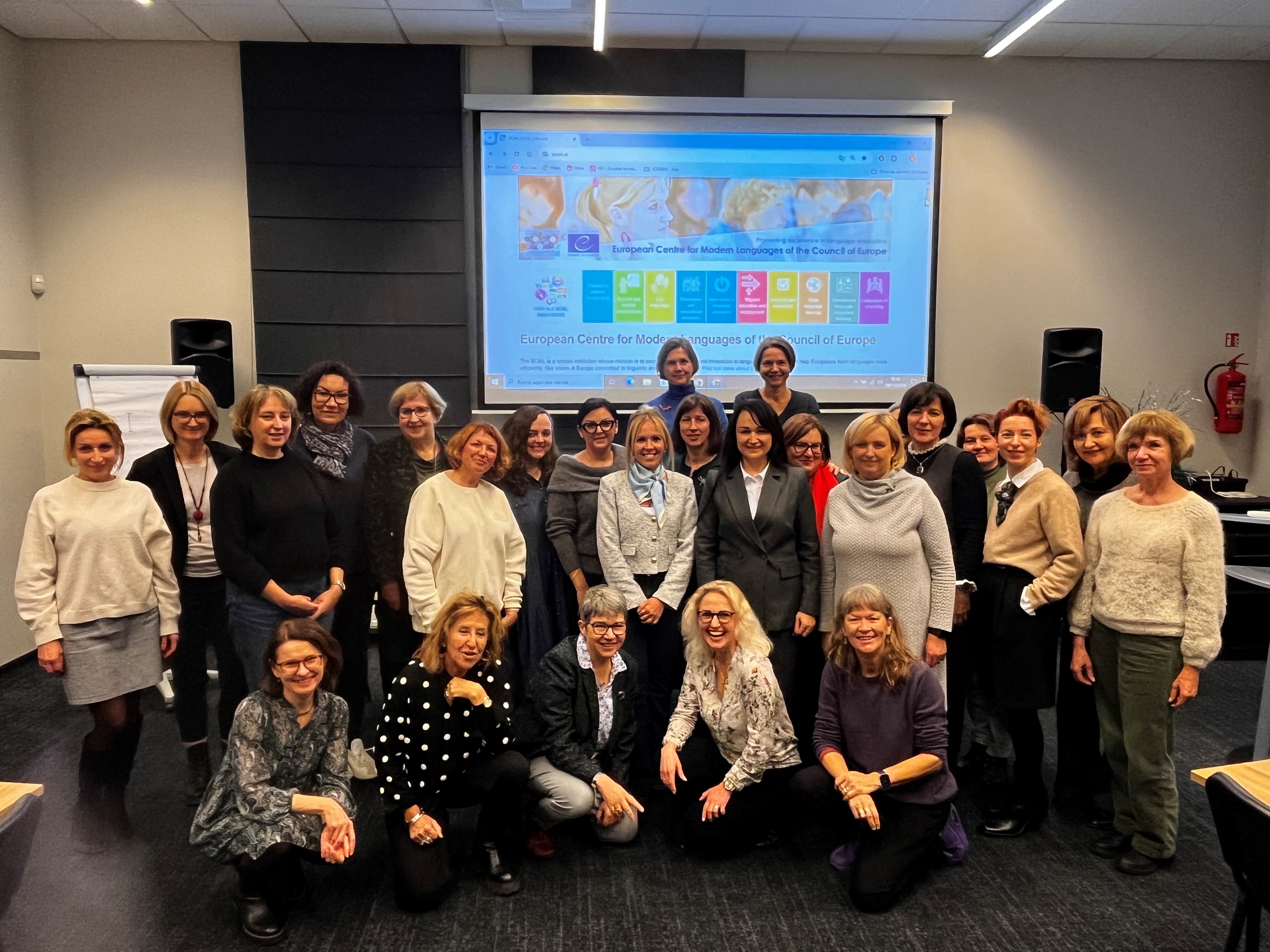
17.12.2024
National Training Workshop “Using ICT in support of language teaching and learning (ICT-REV)” (8-9 November 2024, St. Gallen, Switzerland)
On November 8 and 9, 2024, employees of cantonal education administrations, language lecturers from various universities of teacher education in Switzerland, teachers at kindergarten, primary and lower secondary level as well as internship supervisors met for a workshop in St. Gallen. The workshop was organized and held in close cooperation with the European Centre for Modern Languages of the Council of Europe (ECML).
The three-person team of experts showed the participants concrete ways in which teachers and learners can be guided and supported so that they can use information and communication technologies in a pedagogically meaningful way in foreign language lessons and engage in virtual exchange with learners from other schools.
In order to achieve this goal, the participants were given ample opportunity on the first day to become aware of the available technologies and to critically reflect on their use in the classroom. Particular attention was paid to the question of their didactic added value.
The second day was used to develop concrete and immediately applicable learning activities. The group work enabled creative collaboration and the peer reviews led to an optimization of the products. These are available to all course participants via the course platform.
The workshop was conducted in collaboration with the European Centre for Modern Languages (ECML), which will also disseminate the learning activities developed on its platform. The workshop was also financially supported by the ECML and the European Commission. The Institute for Linguistic and Literary Education (ISLB-PHSG) took on the role of local organization in order to provide an ideal setting for the course leaders and participants. The experts came from the ICT-REV project of the ESFZ. The participants were approached and recruited by the ISLB-PHSG. An important criterion was the participants' ability to disseminate the knowledge they had acquired after the workshop. This can be done through use in courses, mentoring, internal teacher training or as part of continuing education programs in the cantons.
News on the PHSG website: https://www.phsg.ch/de/news/workshop-zu-digitalen-tools-fuer-das-sprachenlehren-und-lernen.
German version:
Am 8. und 9. November 2024 trafen sich Mitarbeitende kantonaler Bildungsverwaltungen, Sprachendozierende verschiedener Pädagogischen Hochschulen der Schweiz, Lehrpersonen der Kindergarten- und Primar- und der Sekundarstufe I sowie Praktikumsleitungen zu einem Workshop in St. Gallen. Der Workshop wurde in enger Zusammenarbeit mit dem Europäischen Fremdsprachenzentrum des Europarats (EFSZ) organisiert und durchgeführt.
Das dreiköpfige Expert:innenteam zeigte den Teilnehmenden konkrete Möglichkeiten auf, wie Lehrpersonen bzw. Lernende angeleitet und unterstützt werden können, damit diese Informations- und Kommunikationstechnologien pädagogisch sinnvoll im Fremdsprachenunterricht einsetzen und mit Lernenden anderer Schulen in einen virtuellen Austausch gelangen können.
Um dieses Ziel zu erreichen, wurde den Teilnehmenden am ersten Tag reichlich Gelegenheit geboten, sich der verfügbaren Technologien bewusst zu werden und deren Einsatz im Unterricht kritisch zu reflektieren. Ein besonderes Augenmerk wurde dabei auf die Frage nach deren didaktischem Mehrwert gelegt.
Der zweite Tag wurde zur Entwicklung konkreter und unmittelbar verwendbarer Lernaktivitäten ein-gesetzt. Die Gruppenarbeiten ermöglichten ein kreatives Zusammenarbeiten, die Peer-Reviews führten zu einer Optimierung der Produkte. Diese stehen via Kursplattform allen Kursteilnehmenden zur Verfügung.
Der Workshop wurde in Zusammenarbeit mit dem Europäischen Fremdsprachenzentrum (EFSZ) durchgeführt, das die entwickelten Lernaktivitäten auf seiner Plattform ebenfalls verbreiten wird. Zudem wurde der Workshop vom EFSZ sowie der Europäischen Kommission finanziell unterstützt. Das Institut Sprachliche und Literarische Bildung (ISLB-PHSG) übernahm dabei die Rolle der lokalen Organisation, um der Kursleitung und den Teilnehmenden einen idealen Rahmen zu bieten. Die Expert:innen stammen aus dem ICT-REV-Projekt des ESFZ. Die Teilnehmenden wurden durch das ISLB-PHSG angesprochen und rekrutiert. Wichtiges Kriterium war dabei die Möglichkeit der Teilnehmenden, das erworbene Wissen im Nachgang zum Workshop zu streuen. Dies kann durch den Einsatz in Lehrveranstaltungen, in Mentoraten, bei schulinternen Lehrer:innenfortbildungen oder auch im Rahmen von Weiterbildungsangeboten in den Kantonen geschehen.
News auf der Webseite der PHSG: https://www.phsg.ch/de/news/workshop-zu-digitalen-tools-fuer-das-sprachenlehren-und-lernen.
Reto Hunkeler, local coordinator
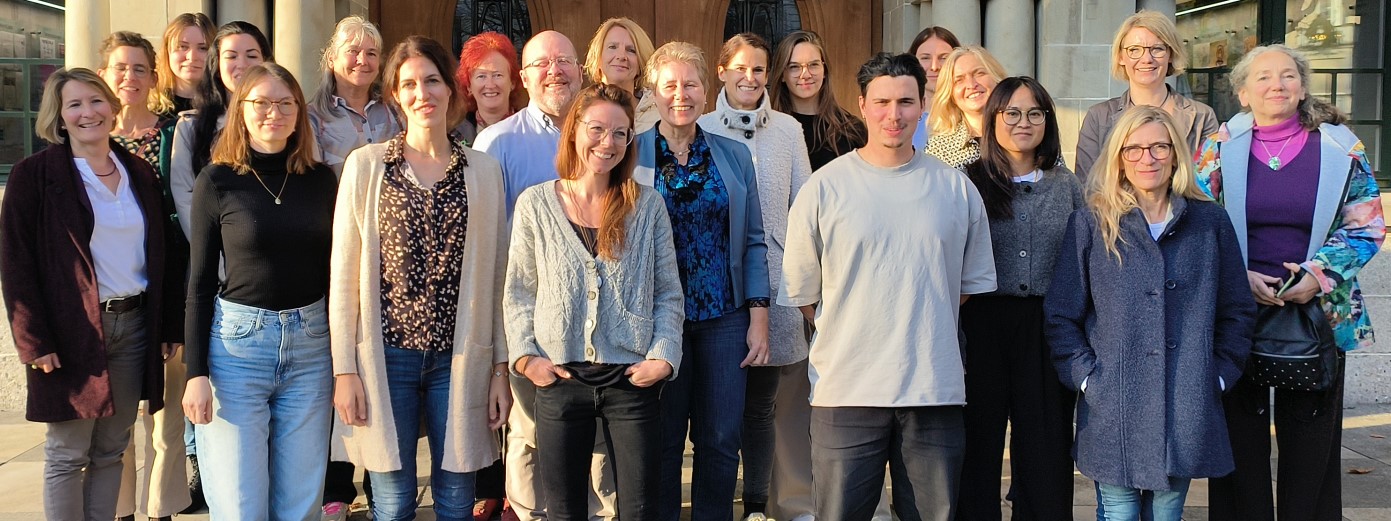
12.12.2024
National training workshop: Relating language curricula, tests and examinations to the CEFR (RELANG) (26 – 27 November 2024, St. Gallen, Switzerland)
Local organiser: Doris Moser-Frötscher, University of Teacher Education St. Gallen
ECML experts: Rita Jukneviciene (Lithuania), José Noijons (Netherlands)
Participants: 19 (language testers and examiners, item writers, teachers and teacher trainers)
On 26 and 27 November 2024, a RELANG workshop was held at the St. Gallen University of Teacher Education, focusing on the linking of the PROF-L language exam to the Common European Framework of Reference for Languages (CEFR) and its Companion Volume (CV). The workshop was organised in cooperation with the European Centre for Modern Languages of the Council of Europe (ECML) and the European Commission.
The first day offered group work and discussions on selected CEFR scales for mediation and their application to the professional language competence profiles for teachers of foreign languages, as well as an insight into the standard setting of reading comprehension tasks. On the second day, the focus was on productive skills. The participants carried out benchmarking exercises for oral and written performance and compared the assessment criteria of the PROF-L exam with those of the CEFR/CV.
The workshop provided theoretical foundations and practice-orientated tools for designing CEFR-compliant examinations. It was financially supported by the ECML and the European Commission with the aim of enabling participants to pass on the knowledge gained to their institutions.
Doris Moser-Frötscher, local coordinator, 11 December 2024
ECML project website: RELANG, ECML-EC cooperation agreement 2024 "Innovative methodologies and assessment in language learning"
03.12.2024
Call for the ECML-EC joint action "Innovative methodologies and assessment in language learning" 2025 – now open until 10 January 2025

Call for the ECML-EC joint action "Innovative methodologies and assessment in language learning" 2025 – now open until 10 January 2025
The European Centre for Modern Languages of the Council of Europe together with the European Commission are launching a new round of workshops within the joint action on Innovative methodologies and assessment in language learning focusing on the following initiatives:
The activities are scheduled to take place between end of February and mid-December 2025, the three initiatives offering up to 18 national workshops during this period.
The call is open to current European Union member states and the additional member states of the ECML until 10 January 2025.
For further information, please contact Adelina Rosca-Birnstingl (adelina.rosca@ecml.at), the ECML-EC cooperation agreement coordinator.
28.11.2024
ECML workshop enhances work-related L2 teaching in Iceland
Local organiser: Vanessa Monika Isenmann, project manager at Mímir - símenntun
ECML experts: Matilde Grünhage-Monetti (Germany, Alexander Braddell (UK)
Participants: 22 Icelandic teachers as well as project managers at Mímir – símenntun
Thanks to the ECML, Mímir, a lifelong learning centre in Reykjavík (Iceland), had the opportunity to host a workshop on work-related L2-Icelandic teaching for teachers and project managers. Led by two ECML experts from the Language for Work network, the workshop provided new insights and ideas regarding the design and planning of more effective L2-courses at the workplace, as well as fresh perspectives and methods for the development of course curricula, lesson structures, and course materials.
The workshop featured inputs from Language for Work partners across Europe, showcasing innovative practices and principles from various contexts. The participants were able to relate these examples to their own settings, identifying opportunities to enhance local practices. This collaborative effort fostered a shared understanding between the participants on how to better support work-related language learning.
The event significantly impacted the participants, offering a clearer vision of effective language teaching for the labour market. This knowledge will enable us to better plan and organize Icelandic courses at workplaces and to promote improved collaboration between our teachers and project managers.
Overall, the workshop achieved both didactic-methodological and strategic goals, marking a transformative step in enhancing adult language education in Iceland.
Why a Language for Work TaC activity is relevant for Iceland
Over the past three decades, immigration has grown profoundly in Iceland. While in 1993 less than 2% of Iceland’s population had foreign nationality, in 2023 more than 17% were non-Icelandic citizens according to Statistics Iceland. At the same time, unemployment is very low in Iceland and the Icelandic labour market depends increasingly on skilled workers from abroad, for example in the health system, childcare, construction, and in the hospitality sector. As a result of this, the demand for Icelandic courses, not least with regard job-related language training, has grown immensely in recent years and with it the need for skilled teachers of Icelandic. However, courses and training opportunities for (future) teachers of Icelandic as a foreign language are rare in Iceland. Especially when it comes to specialized job-related Icelandic courses, training opportunities for teachers are few and far between. Therefore, our Icelandic teachers greatly benefit from well-structured and established teacher education regarding job-related language teaching.
Vanessa Monika Isenmann, project manager at Mímir - símenntun
Related links (available in English and French)
